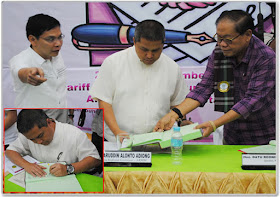ISABELA CITY, Basilan, Dec 19 (PIA) – The Bureau of Public Information announced that the Autonomous Region in Muslim Mindanao (ARMM) has finally got its own administrative code after six long years of waiting, owing to the assertive operation of the current regional officials and the relentless backing of the Japan International Cooperation Agency (JICA).
Information chief Ali Macabalang disclosed that outgoing Acting ARMM Governor Ansaruddin Alonto-Adiong signed into law Thursday Muslim Mindanao Act (MMA) No. 287, also known as the Administrative Code of the autonomous region, in fully-packed ceremonies at the huge Shariff Kabunsuan Cultural Complex in Cotabato City.
In his speech, Adiong expressed his pleasure that it is during his term of office that the code was completed and signed into law to firm up and strengthen the ARMM bureaucracy towards bringing the autonomous region to development.
“This is a milestone achievement as it goes beyond politics and personal interests,” he said.
Adiong, who is serving on a holdover capacity alongside 23 other elected officials pending final decision of the Supreme Court on a law allowing the President to appoint caretakers, urged the ARMM workers “to perform and exercise powers, duties, responsibilities and functions within the parameters of the administrative code.”
He also cited the Japanese government and its people who provided significant support during the more than five years of protracted crafting the regional Administrative Code.
“I convey my thanks to the Japanese government and its people through the JICA for being with us as we endeavored to craft policies, principles and provisions for an effective administrative code,” he said.
He also lauded the technical working group and the Regional Legislative Assembly (RLA) for the drafting and subsequent passage of the law he described as “very vital” in the enhancement of the ARMM bureaucracy.
Assemblyman Ziaur-Rahman Alonto-Adiong, Regional Assembly Assistant Majority Floor Leader and MMA 287 principal author, expressed his confidence that the administrative code, formerly filed as RLA Bill No. 72, will institutionalize the much needed reforms in the ARMM.
“This will strengthen our bureaucracy towards efficiency, effectiveness and transparency to be at par with national counterparts in terms of providing services to the people, by placing ahead the idea of common good,” he said.
“The Admin Code is our answer to P-Noy’s call for ‘Daang Matuwid’,” he added.
ARMM Executive Secretary Atty. Naguib Sinarimbo delved deeper into the significance of the MMA 287 by explaining to the employees and officials of ARMM the implications of the law to the ARMM bureaucracy.
He said that the code would bring radical consequences on the current positions of employees of ARMM.
“We should go beyond personalities, and we need to find a deeper meaning and reason to report to our duties in ARMM,” Sinarimbo said adding that every employee and officials of ARMM must reflect on the vision for ARMM as well as the steps by which this vision will be collectively pursued.
“Let us ask ourselves what is the value proposition that we could offer to our constituents,” he added.
He said that the administrative code will be the mechanism to pursue the vision for ARMM and in effectively responding to the needs of its people.
“The administrative code is a testament of our commitment to institute serious reforms in ARMM,” he said.
Earlier, Sinarimbo said that the Administrative code will insulate the regional bureaucracy from the inescapable changes in its leadership which tends to disrupt the continuity and permanence of critical expertise and knowledge in its line agencies as appointments in key positions in the bureaucracy are prone to political patronage and influence.
Administrative Director Lydia Udaundo-Mastura, head of the Technical Working Group in the Preparation of the Code Director, explained that the edict has been drafted since 2005 but was “overtaken by time.”
According to her, it was included also in 2006 during the term of former ARMM Governor Zaldy Uy Ampatuan as a priority in his Regional Executive Agenda.
In 2008, with the continued support of JICA, she said, they embarked again on write-shops and consultations with help from their legal consultant, Atty. Randolph Parcasio. They submitted the draft to Acting Regional Governor Ansaruddin Adiong on January 28, 2011 who in turn signed it as a priority bill for the Regional Assembly to pass.
Mastura said that the code now sets the rules, mandates, systems, procedures of the ARMM agencies such as accountability and transparency and efficiency in responding to the needs of the agencies, local government units and other stakeholders.
“I wish to congratulate all of us for this historic event and for those who will be ‘adversely’ affected by this code we extend our sincere apologies,” she said. (BPI-ARMM/RVC-PIA9 ZBST)


